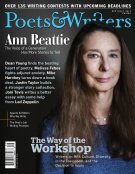It can be daunting for a poet to find a mentor, and even harder to find one who’s a good fit—who not only writes work that is personally inspiring, but is also accessible and willing to share time and expertise. Outside of MFA programs, writing centers, and writing conferences—all of which can be prohibitively expensive and time-consuming—there seem to be few opportunities for emerging writers to find and develop relationships with those more established in the field—relationships that can be key to a new writer’s success. In an effort to address this deficit, the literary nonprofit Brooklyn Poets launched the Bridge (poetsbridge.org), a new online platform to foster such connections. Like a social network for poets, the Bridge offers a place for student and mentor poets to meet, read each other’s work, and discuss issues of craft.
“I saw two very clear needs in the community: students and poets looking for mentors, and graduates of writing programs looking for jobs,” says Jason Koo, a poet, teacher, and the founder of Brooklyn Poets, which offers poetry workshops, readings, and other resources in New York City. “I met many people who didn’t have the time or money to sign up for one of our five-week workshops, but they were interested in working one-on-one with our professors and attending our monthly workshops and open mics. The inspiration behind the Bridge was simply to connect these two groups who need each other.”
Though it officially launched this past March, the Bridge has been in the works for a few years. Brooklyn Poets launched an Indiegogo fund-raising campaign for the platform in November 2013 and raised over twenty-three thousand dollars from more than two hundred fifty donors. Now mostly built out, the Bridge website features profile pages for both mentor and mentee poets, as well as spaces for poets to post work and comment on one another’s poetry. To apply to be a mentor, a poet may submit a résumé, a URL to his or her website, and a sample critique. “Anybody who has a solid professional base of writing and critiquing poems is, we think, entitled to offer critiquing services on the Bridge,” Koo says. “We’re not interested in qualifying you; we’re interested in enabling you.”
For mentees, the Bridge offers a flexible way to solicit informed feedback on their work. Mentees can browse through mentor profiles—each of which includes the mentor’s bio, poetry, and critiquing services and rates—to find a good match. Mentors set their own rates, though Koo suggests charging $15 for a single poem and $250 for a full-length book. The process is effortless, reports Sarah Jones, a Seattle-based poet who has used the Bridge. After deciding that Joanna Valente—the author of two poetry collections, most recently The Gods Are Dead (Deadly Chaps Press, 2015)—was her top choice, Jones sent Valente a brief message about her own poetry and explained why she was choosing her as a mentor. Then she uploaded six poems. “Within a week,” Jones says, “Joanna had sent me an in-depth critique. She let me know what I needed to work on in general as well as what I needed to do to make these poems better. Joanna was encouraging throughout. I came away with new insights into my poetry and a mentor I could lean on in the future—which I’ve already done three times now!”
In the face of increasingly competitive and expensive programs, some could consider the Bridge to be an online alternative to the MFA. “There will always be new writers looking to work with specific established writers, so initiatives like the Bridge won’t make MFA programs obsolete,” says Roberto Garcia, a poet, an alum of Drew University’s MFA program, and a user of the Bridge. “However, it provides an alternative, a new direction, a place to visit and find community. It can also function as an extended community for post-MFA poets. After a few years in an MFA program, [writers] might want to read new voices, have fresh eyes read their work, and meet new communities.”
The community demographic of the Bridge is diverse; everyone—from well-established poets in the academy to writers just starting out—is getting involved. “We do this in a local way...trying to merge professional poets who’ve gotten graduate degrees and teach in universities with people who’ve never written poems before,” says Koo. “Many people who come to us used to write in school and want to get back to it or write on their own but don’t usually share their work with anybody. We see everyone from college students to people in their sixties and seventies, from all kinds of sociocultural backgrounds.” Koo estimates that close to five hundred poets have joined the site, with fifty to seventy-five poets signing on as mentors.
“Hart Crane saw the Brooklyn Bridge as a gateway to the rest of America,” Koo says, “and we wanted to build something commensurate that would connect the poetry communities we have here with communities elsewhere.”
Marwa Helal is the cofounder of FEN Magazine. Her work has appeared in the American Book Review and Egypt Today Magazine. Follow her on Twitter, @marwahelal. Her website is marshelal.com.








